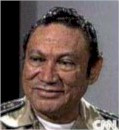GAMBOA, Panama, (Reuters) – Manuel Noriega, Panama’s drug-running military dictator of the 1980s, was extradited home yesterday and taken straight to prison to serve a 20-year sentence for the murders of opponents during his rule.
Noriega was toppled in a U.S. invasion of Panama in 1989 and had spent the last two decades behind bars, first in Florida and then in France after being convicted for drug trafficking and money laundering.

Accompanied by Panama’s attorney general and a doctor, he arrived last evening from France on a commercial flight and was flown in a helicopter to the outskirts of a jungle-surrounded penitentiary beside the Panama Canal.
The 77-year-old was driven into the prison past a small group of protesters and media in a sports utility vehicle and bundled into a wheelchair.
A physically diminished shadow of the strongman once known for waving a machete while delivering fiery speeches, Noriega’s return is unlikely to have a major political impact on a country that has enjoyed an economic boom in recent years.
Widely reviled when he was Panama’s de facto leader from 1983 until 1989, his small cadre of remaining supporters has kept a low profile and even bitter opponents dismiss Noriega as part of a distant, shadowy past.
Much of the focus on Noriega will be on whether he sheds any light on the dictatorship’s mysteries, including some 100 unsolved killings or disappearances in the period of army rule from 1968 to 1989.
Noriega was convicted in absentia in three homicide cases involving 11 murders, including the 1985 beheading of Hugo Spadafora, a physician who threatened to reveal Noriega’s drug ties, and the 1989 execution-style slaying of nine officers who staged a failed coup.
Sentenced to 20 years in each case, he will serve the terms concurrently. Official photographs of the facility prepared for him at the El Renacer prison showed a spartan, beige-painted cell with a bathroom, table and small bed.
Noriega will also face charges over the 1970 murder of Heliodoro Portugal, an opponent of Panama’s military leaders.
“We hope he talks and says where the rest of the disappeared are, what happened to those who were killed,” said Portugal’s daughter, Patria Portugal.
BITTER MEMORIES
Noriega qualifies for house arrest due to his age but the decision rests with the government. His lawyer, Julio Berrios, said house arrest would also imply an acceptance of his sentence and mean Noriega could not launch a legal challenge.
Leaders of a civilian movement that protested Noriega’s regime in the late 1980s urged the government to keep him in prison, equating house arrest with virtual freedom. “People who have … been accused and sentenced for killing people have to serve their sentences, independently of their age,” said Aurelio Barria, a businessman who spent the last years of Noriega’s rule in exile in fear for his life.
